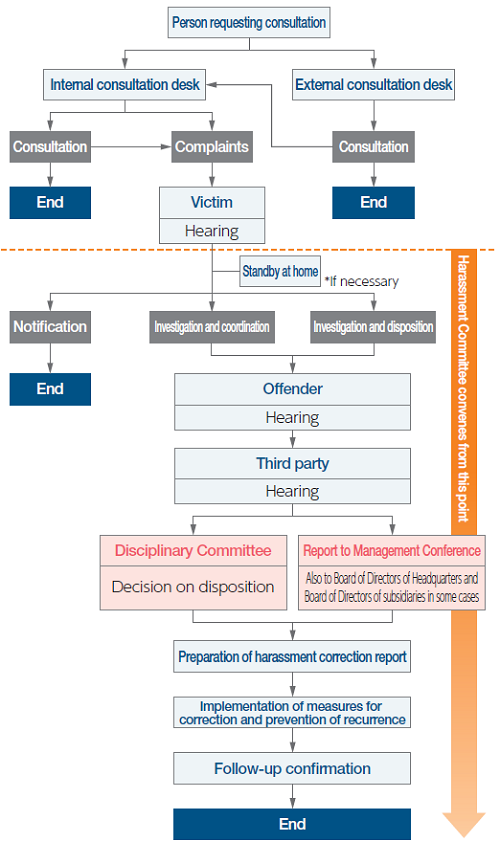Companies must recognize their potential for unintentionally affecting human rights, directly or indirectly, in the conduct
of their business, and must engage in business activities with awareness of respect for human rights. The TOKYO KEIKI
Group will fulfill its corporate responsibilities on a basis of respect for the human rights of our stakeholders and of all
people.
Concepts and policies regarding human rights
We will respect human rights and will appropriately manage
personal information. Under the idea that providing motivating
workplaces while respecting the human rights, personalities,
and individualities of employees aids in maintaining and
strengthening our competitiveness, we aim to be a
company where diverse human resources can play active
roles regardless of race, nationality, gender, age, or other
characteristics. We also monitor the business activities of
overseas subsidiaries and suppliers in everyday work to
ensure the absence of human rights violations.
(From our Code of Conduct and Corporate Governance Guidelines)
Initiatives related to human rights
Initiatives to prevent harassment
- Policy on the prevention of harassment
The Group creates work environments in which all employees
can exert their capabilities to the utmost and pursue their
potential. At the same time, to achieve pleasant workplaces
where people can actively collaborate and cooperate with
others, we seek to take measures to prevent and eliminate
harassment in workplaces and to respond promptly and fairly
to complaints and requests for consultations concerning
harassment.
- Regulations for the prevention of harassment
Our Harassment Prevention Regulations define power
harassment, sexual harassment, and other forms of
harassment, and address topics including prohibited actions
and LGBT issues. The regulations are applied not only to
all officers and employees working in the Group but also to
customers and business partners when the noted parties are
involved.
We have set up consultation desks shared across the
Group, both inside and outside the Company, to accept
information from persons who have been subjected to harm,
from persons who have witnessed or heard of incidents
of harassment, or from other third parties who experience
suspicions. When a matter is deemed to be of severe degree,
the Harassment Committee will make a determination of
whether harassment has occurred, seeking input from
attorneys and other experts. Following that, the Committee
will report to the Management Conference (in the case of a
subsidiary, to the subsidiary’s Board of Directors as well) and
to the Board of Directors of Headquarters as necessary, and
will make a report and entrust consideration of disposition to
the Disciplinary Committee. The Harassment Committee will
then consider and implement measures for correction and
prevention of recurrence, after which the Committee, the head
of the relevant department, and management supervisors will
prepare a corrective action report.
The problem-solving process
